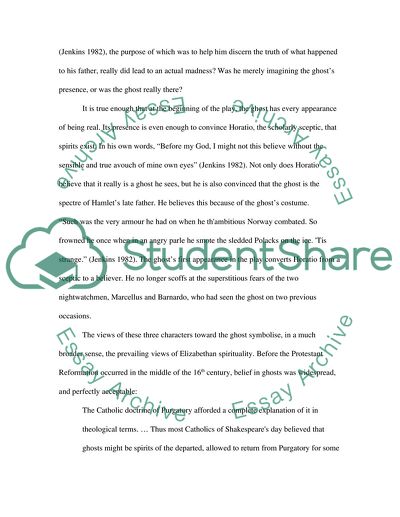Cite this document
(Embodiment of Hamlet's Ghost Essay Example | Topics and Well Written Essays - 1750 words, n.d.)
Embodiment of Hamlet's Ghost Essay Example | Topics and Well Written Essays - 1750 words. https://studentshare.org/performing-arts/1535809-shakespeares-hamlet-consider-the-significance-and-importance-of-the-ghost-to-the-play-to-the-other-characters-and-to-the-audience-both-contemporary-and-eliz
Embodiment of Hamlet's Ghost Essay Example | Topics and Well Written Essays - 1750 words. https://studentshare.org/performing-arts/1535809-shakespeares-hamlet-consider-the-significance-and-importance-of-the-ghost-to-the-play-to-the-other-characters-and-to-the-audience-both-contemporary-and-eliz
(Embodiment of Hamlet'S Ghost Essay Example | Topics and Well Written Essays - 1750 Words)
Embodiment of Hamlet'S Ghost Essay Example | Topics and Well Written Essays - 1750 Words. https://studentshare.org/performing-arts/1535809-shakespeares-hamlet-consider-the-significance-and-importance-of-the-ghost-to-the-play-to-the-other-characters-and-to-the-audience-both-contemporary-and-eliz.
Embodiment of Hamlet'S Ghost Essay Example | Topics and Well Written Essays - 1750 Words. https://studentshare.org/performing-arts/1535809-shakespeares-hamlet-consider-the-significance-and-importance-of-the-ghost-to-the-play-to-the-other-characters-and-to-the-audience-both-contemporary-and-eliz.
“Embodiment of Hamlet'S Ghost Essay Example | Topics and Well Written Essays - 1750 Words”. https://studentshare.org/performing-arts/1535809-shakespeares-hamlet-consider-the-significance-and-importance-of-the-ghost-to-the-play-to-the-other-characters-and-to-the-audience-both-contemporary-and-eliz.


